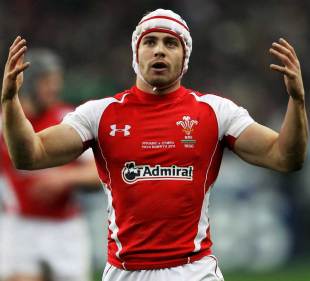|
France 28-9 Wales, Six Nations, Stade de France, March 19
A shadow of their former selves
Huw Baines
March 19, 2011

Wales wing Leigh Halfpenny shows his frustration
© Getty Images
Enlarge
After the thrills dished out by Ireland in Dublin, this year's Six Nations was perhaps destined to end with a whimper as Wales took on an under-pressure France in Paris. Those with romance in their hearts would have pointed to a match-up between the game's free spirits as the perfect way to round off a tournament that has all too often needed an injection of pace and flair, but the France and Wales of 2011 are not willing, or in some cases able, to deliver fireworks as their predecessors did. In the wake of Marc Lievremont's shocking, but undeniably entertaining, attack on his players following their defeat to Italy last weekend, those with a passion for trying to predict the unpredictable pegged the hosts as possible winners in a landslide of Gallic flair, where their faults and insecurities were cast aside in the tradition of Messrs Blanco, Sella and Saint-Andre. It didn't materialise. Instead we saw a French side dominate their opponents up front and win the game thanks to some masterful breakdown play and aggressive counter-rucking. Rarely will a Test match be decided so plainly by one side's aptitude in a single discipline but France caused untold problems for Wales with their precise work against often isolated attackers. Their first try, one of two to lock Lionel Nallet, was a direct result of their pouncing on an opportunity afforded them by Lee Byrne, who had gone it alone on his 22 and paid the price. The injured Sam Warburton was sorely missed, but Wales failed to heed this warning and consistently sent lone runners barrelling into the opposition line, after which scrum-half Mike Phillips was given a torrid time as he looked to retrieve the ball. The Ospreys No.9 is not afraid of rolling his sleeves up and getting involved but on this occasion there was so little protection offered by his pack that he had no hope of delivering playable ball to James Hook, whose performance nevertheless left plenty to be desired. After turning in a largely positive kicking display against Ireland last weekend the Perpignan-bound playmaker again played conservatively but this time to little effect, smacking the leather off the ball during a slow opening period. One break, followed up well by Byrne but no-one else, highlighted the danger he can pose in the loose but he has failed to deliver on the promise shown in the opening moments against Scotland and in his shift at outside-centre against Italy. While France proved that they have a mercilessly effective forward game when they choose, both teams showed a lack of invention behind the scrum that is not traditionally associated with them. France, featuring five changes from the team beaten in Rome, made frequent headway with their maul and through their dominance of the breakdown, so shelved any plans to test Wales in the backs. On the occasions that questions were asked of them in defence, Wales again stood up well but were guilty of gift-wrapping France's points for them. Both of Nallet's tries were the result of errors and Vincent Clerc's well-worked effort was scored against 14 men after Hook was harshly sin-binned. The visitors travelled without defence coach Shaun Edwards due to an undisclosed disciplinary breach but his signature was again all over Wales' well-drilled blitz defence, their one consistent pillar of strength. Head coach Warren Gatland expressed his disappointment at the final whistle and lamented a 'backward step' for his side, and it is difficult to argue with the Kiwi's assessment. Despite the fact that it was a tall order, Wales entered this game with the mathematical chance of a Championship. Eighty minutes later, they sat fourth in the table on points difference, which is perhaps a fairer picture of their place in the international pecking order. Like a second division football team gifted a tie at Old Trafford in the third round of the FA Cup, Wales were well-drilled and gritty until they went behind - and their lack of a Plan B was ruthlessly exposed. Their inability to hurt France with ball in hand created a cushion for the hosts that they had done nothing to deserve - respect by default, if you will. Under Gatland and Edwards Wales have become difficult to beat, but they have lost their ability to play what is in front of them, to 'give it a crack'. George North's second-half surge from his own 22 was a rare high-point but rather than the abundant offloading of the brilliant, but unsustainable, 2005 Grand Slam side, the support play was pedestrian and poorly executed in the case of Alun-Wyn Jones' basketball offload. There is plenty to like about the new-look Wales, namely their defence and the younger players who have revitalised their pack, but the nagging feeling remains that something crucial is missing from their armoury. Unfortunately, it can't be coached into a side. Perhaps it can be coached out of one, though. © ESPN Sports Media Ltd. Huw Baines is the Assistant Editor of ESPNscrum.
|
Live Sports
Communication error please reload the page.
-
Football
-
Cricket
-
Rugby
-
- Days
- Hrs
- Mins
- Secs
F1 - Abu Dhabi GP
Abu Dhabi Grand Prix December 11-131. Max Verstappen ()
2. Valtteri Bottas (Mercedes)
3. Lewis Hamilton (Mercedes)
4. Alexander Albon ()
5. Lando Norris ()
6. Carlos Sainz Jr ()
-
ESPNOtherLive >>
Golf - Houston Open
Snooker - China Open
Tennis - Miami Open

